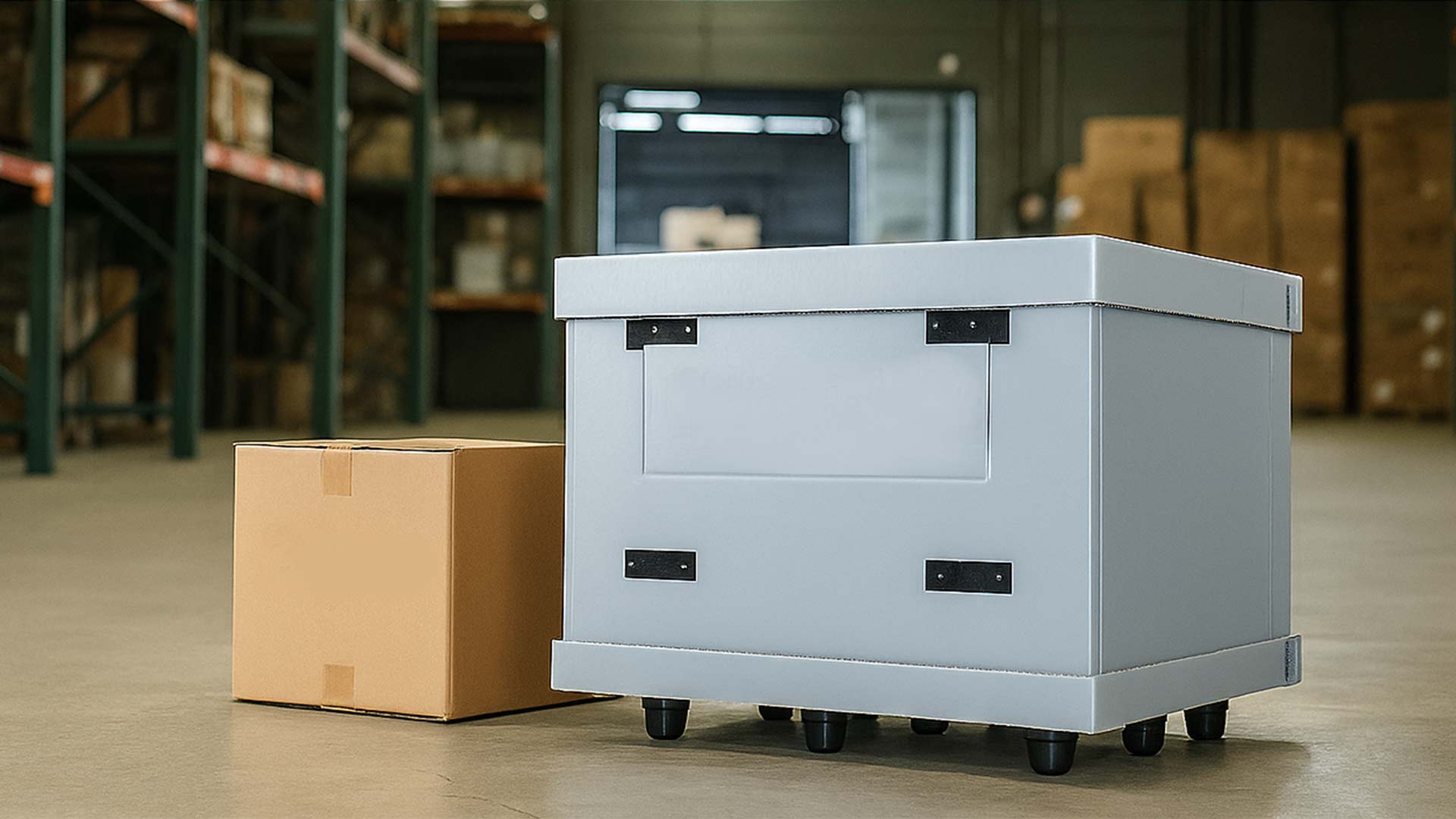Across business and logistics, there’s a good chance your current packaging system is costing more than it should, through damage, waste, or inefficiency.
Cardboard has long been the go-to, but let’s be honest, it’s not built to last. One-time use, low load tolerance, and susceptibility to weather and wear make it an expensive convenience in disguise.
On the other hand, collapsible rigid boxes are quietly becoming the smarter, more sustainable choice. They're not just an upgrade; they’re a shift in how industries now think about movement, storage, and reusability. From manufacturing floors to distribution hubs, transport packaging solutions are evolving, and for good reason.
In this guide, we break down how collapsible rigid boxes stack up against traditional cardboard, why they’re being adopted across industries, and how Nilkamal’s PackGUARD gives this category a powerful edge.
The Problem with Cardboard in Industrial Transport Packaging
Cardboard is affordable. It’s everywhere. But it has one fatal flaw: it doesn’t hold up.
For industries dealing with technical materials, machine components, or anything even moderately heavy, cardboard quickly starts showing its limitations. It wasn’t designed for the kind of pressure, wear, and environmental exposure that real-world logistics demand.
Boxes collapse under stacked loads, corners crush in transit, and even minor exposure to water can compromise the integrity of the packaging.
Why cardboard packaging falls short:
-
It’s prone to damage from moisture and humidity
-
Once crushed or torn, it's no longer usable
-
It offers limited protection in transit
-
It contributes to recurring packaging costs due to its disposability
In the evolving industrial environments, efficiency is everything. Businesses today can't have constant replacement or downtime because a flimsy box couldn't survive the loading or transportation. That’s where the shift begins.
Collapsible Rigid Boxes: Durable and Foldable Packaging for Industrial Use
Unlike traditional cardboard, collapsible rigid boxes are designed to last. They combine the strength of rigid packaging with the flexibility of being foldable, making them a cost-conscious and space-efficient investment. And no, they’re not clumsy to store when not in use; they fold flat and stack neatly.
Here’s what sets these apart:
-
Durability: Constructed to withstand repeated use and harsh industrial environments
-
Space Efficiency: Fold and store when not in use, keeping warehouses clutter-free
-
Consistency: Retain shape and load-carrying capacity across multiple trips
-
Sustainability: The majority of these boxes are designed to be reused, mimimising packaging waste considerably.
Their design provides greater support for pallesation and stacking, reducing product damage and improving storage safety.
Reusability That Impacts the Bottom Line
In logistics and supply chains, small changes can deliver big savings. Switching to reusable packaging boxes reduces the need for frequent repurchases and lowers waste disposal costs.
A single collapsible rigid box can replace dozens of single-use cardboard cartons. Over time, this translates to lower per-trip costs and a significant reduction in environmental impact.
Where reusability creates value:
-
Long-term cost savings through repeat usage
-
Fewer delays or handling issues caused by damaged packaging
-
Lower environmental compliance costs
-
Improved handling with consistent box quality
Reusable packaging isn’t just good for the environment; it makes operational sense.
Foldable Packaging: A Game-Changer for Storage and Logistics
Industries that rely heavily on space, like automotive, warehousing, and FMGC, are quickly shifting to foldable packaging options. The ability to collapse empty boxes means fewer return trips, lower reverse logistics costs, and better vehicle utilisation.
You get the strength of a rigid container with the flexibility of a foldable design. And when you’re managing thousands of units every month, that flexibility adds up fast.
Foldable packaging is especially useful in closed-loop systems, where packaging is cycled back to the original point for reuse. Nowadays, it’s not merely a packaging choice; rather, it becomes part of your system’s efficiency.
Where Nilkamal’s PackGUARD Elevates Transport Packaging Solutions
PackGUARD from Nilkamal isn’t a collapsible box on its own, it’s the advanced material that enables durable, reusable transport packaging solutions. It’s fabricated into industrial boxes, separators, crates, and panels that hold up under repeated use, harsh handling, and varying environments.
What makes PackGUARD ideal for rigid packaging:
-
Circular honeycomb structure provides unmatched rigidity and even load distribution
-
Available in multiple GSM ranges, allowing for tailored strength
-
Lightweight yet capable of supporting heavy items
-
Liquid-resistant, protecting contents in variable environments
-
CNC and laser-compatible, easy to fabricate with precision
-
Custom add-ons: Partitions, handles, fasteners, and more
-
Custom branding possible with screen printing
-
Reusable over many cycles, ensuring return on packaging investment
-
100% recyclable, aligning with green supply chain goals
PackGUARD packaging doesn’t fold flat once built, but it’s made to endure long-term industrial use with ease. It supports businesses that need rigid, custom-fabricated packaging, the kind that performs under pressure and does so over and over again.
Making the Shift to Smarter, Reusable Packaging
Transitioning from cardboard to collapsible rigid boxes isn’t a flashy change. But it is a smart one. Especially when your operations demand speed, precision, and resilience.
Your packaging should be working just as hard as your production team. It should save space, protect your goods, and cut unnecessary costs, without asking you to compromise. If your current packaging material can't handle moisture, rough handling, or stacking pressure, it's costing you more than you think.
In this blog, we’ve outlined how collapsible rigid boxes outperform cardboard in every critical metric that matters to manufacturers, warehouse managers, and supply chain leaders. From reusability and space optimisation to long-term durability, the advantages are clear.
And with industrial-grade solutions like Nilkamal PackGUARD, the shift becomes less of a question and more of a practical next step. If you’re ready to rethink how your goods move, PackGUARD is already built for it.





